电大 开放英语1 学习辅导 Unit 9 Things and People 学习辅导
开放英语1 Unit9-10 11.15(第六次课)

肯定式:主语+ can +v+…
否定式:主语+can't ( can not) + v+…
疑问式: Can +主语+v+…?
e.g. You cannot/ can’t go out to play now. 你不允许现在出去玩. 练习题:P87 Activity 2、3 ;P88 Activity 5、6
广州市广播电视大学蓝星分校
ቤተ መጻሕፍቲ ባይዱ
3. 留口信: e.g. Any message for him? 有口信给他吗? Can I take a message? 要留个口信吗? May I take a message? 留个口信好吗? Would you like to leave a message? 您想留个口信吗? Do you want to leave a message? 您想留个口信吗? I’ll call him back. 我会再打电话给他的。
广州市广播电视大学蓝星分校
表示允许与不允许(P86)
情态动词 can用来表示“允许”与may同义,它与别的情态动词 一样,不能单独作谓语,必须与一个动词一起来作谓语。不随 人称变化。构成疑问时,只需将can 提到句首。它的否定可以 是can’t 也可以是cannot 。 e.g. You can smoke in the garden. You can't smoke in the kitchen. Can I use the cooker in the kitchen?
/iə/ /eə/ /ʊə/
集中 双元音
广州市广播电视大学蓝星分校
辅音(28个)
轻辅音 /p/ 浊辅音 /b/ 轻辅音 /ts/ 浊辅音 /dz/ 鼻音 /m/ / t/ /d/ /ʃ/ /ʒ/ /n/ /j/ / k/ /g/ /tʃ/ /dʒ/ /ŋ/ 边音 /ǀ/ /f/ /v/ /tr/ /dr/ /s/ /z/ / h/ /r/ /θ/ /ð /
电大 开放英语1 学习辅导Unit 2 Meeting and Greeting
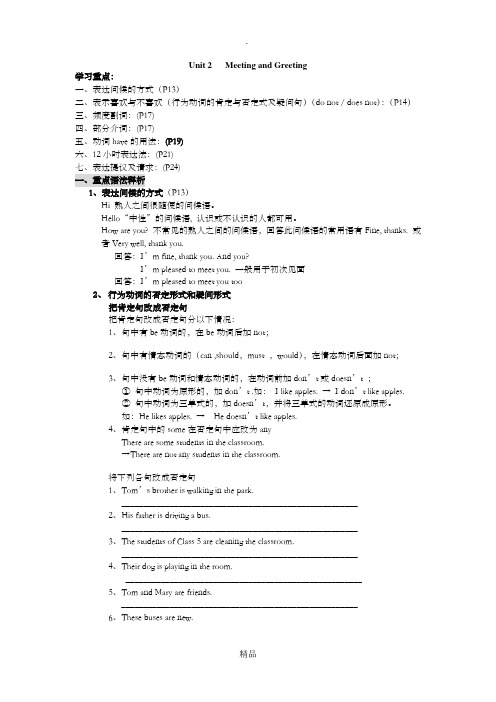
Unit 2 Meeting and Greeting学习重点:一、表达问候的方式(P13)二、表示喜欢与不喜欢(行为动词的肯定与否定式及疑问句)(do not / does not):(P14)三、频度副词:(P17)四、部分介词:(P17)五、动词have的用法:(P19)六、12小时表达法:(P21)七、表达提议及请求:(P24)一、重点语法释析1、表达问候的方式(P13)Hi 熟人之间很随便的问候语。
Hello“中性”的问候语, 认识或不认识的人都可用。
How are you? 不常见的熟人之间的问候语,回答此问候语的常用语有Fine, thanks. 或者Very well, thank you.回答:I’m fine, thank you. And you?I’m pleased to meet you. 一般用于初次见面回答:I’m pleased to meet you too2、行为动词的否定形式和疑问形式把肯定句改成否定句把肯定句改成否定句分以下情况:1、句中有be动词的,在be动词后加not;2、句中有情态动词的(can ,should,must ,would),在情态动词后面加not;3、句中没有be动词和情态动词的,在动词前加don’t或doesn’t ;①句中动词为原形的,加don’t .如:I like apples. →I don’t like apples.②句中动词为三单式的,加doesn’t,并将三单式的动词还原成原形。
如:He likes apples. →He doesn’t like apples.4、肯定句中的some在否定句中应改为anyThere are some students in the classroom.→There are not any students in the classroom.将下列各句改成否定句1、Tom’s brother is walking in the park.______________________________________________________2、His father is driving a bus.______________________________________________________3、The students of Class 5 are cleaning the classroom.______________________________________________________4、Their dog is playing in the room.______________________________________________________5、Tom and Mary are friends.______________________________________________________6、These buses are new.______________________________________________________ 7、There are some books in the bookcase.______________________________________________________ 8、There is a banana in the box.______________________________________________________ 9、I’m a student.______________________________________________________ 10、She is a farmer.______________________________________________________ 11、Your father can ride a bike.______________________________________________________ 12、Mr. Li can draw pictures.______________________________________________________ 13、They can play football after school.______________________________________________________ 14、I can go to Shanghai Zoo.______________________________________________________ 15、You should climb the tree.______________________________________________________ 16、We come from China.______________________________________________________ 17、It’s time for sports.______________________________________________________ 18、We like the mask.______________________________________________________ 19、He likes the violin.______________________________________________________ 20、Have some bread, Tom.______________________________________________________ 21、Please open your books.______________________________________________________ 22、I like Chinese、Maths、Art and PE.______________________________________________________ 23、Listen to the radio, please.______________________________________________________ 24、Kick the ball to me.______________________________________________________ 25、Peter, drink some juice, please.______________________________________________________ 26、Please watch TV.______________________________________________________ 27、I am a bus driver.______________________________________________________ 28、The dog can jump.______________________________________________________29、Today is Monday.______________________________________________________30、They are good friends.______________________________________________________一般疑问句的构成(P19)1. 概念能用yes / no(或相当于yes / no)回答的问句叫一般疑问句。
优质文档Unit1电大开放英语1

• 名词后加 ---’s • Read the sentences and translate .
• Sally’s friend is Greek. • The manager’s home is in London. • What is Polly’s job?
• Practice: P6 activity 13
在介绍人的用句中,相关的语言 点
• 动词 to be的形式随主语变化 • 动词 to be的否认句、一般疑问句和特殊
疑问句及答复
• 人称代词、形容词性物主代词、名词后加 -’s
• 英语中多数动词是规那么动词,注意主语 是第三人称单数时的动词尾的变化
英语中的名词有单、复数之分,大多数名 词复数是规那么变化,少数为不规那么变
• 英语中多数动词是规那么动词,注意主语 是第三人称单数时的动词尾的变化
英语中的名词有单、复数之分,大多数名 词复数是规那么变化,少数为不规那么变 化,注意读音
人称代词,形容词性物主代词、
• I、 we、 you、 he、she、they、it、my 、our、your、his、her、their、its
Likings: I like doing
Oral practice in class 2
• How to ask for information of others • 询问工程重要句型相关语法点 • Name: What is your/his/her name? • Job: What is your/her/his job? What do
studies in a high school.
• Mary _____(like) watching TV while her sisters ______(like) dancing. Activity 14 / 15
电大开放英语1(光盘)参考答案(1)

u
b u
p
N
u
p
b u
p p
u
p u
p N
b p u u p p u u b u j b u u
u
u b
p
p p
p
u u u u b b u p u u u p u
u uj
b u p
u
N u p u u
u
N u
b
u b
u b
p u
u u u
u
b u b u u
u
u u p u b u b p p
p p
u u u
u u
p
/
u
b
u b p u
/
u u u / u
b u
p
/
p u
N b p u b u
/
b u
p
p
u
u
b
b
b
b
b
b
b
b
b b b
b
b b
b b
b b
b
b p p
b
b
b
b
b b
b b b
u b
u
b b
b
b u
u
b
b b
p b p
b u
b
b u
b
b p
u
b u
u
p u p u p u u u p u u
b
b j
u p
j
p
b b p
p
u p
j
u b
p
p
u b
b u p u u u u
p
b p p / u p p / / u u p p
国家开放大学电大本科《高级英语(1)》形考网络课网考作业及答案(第一套)
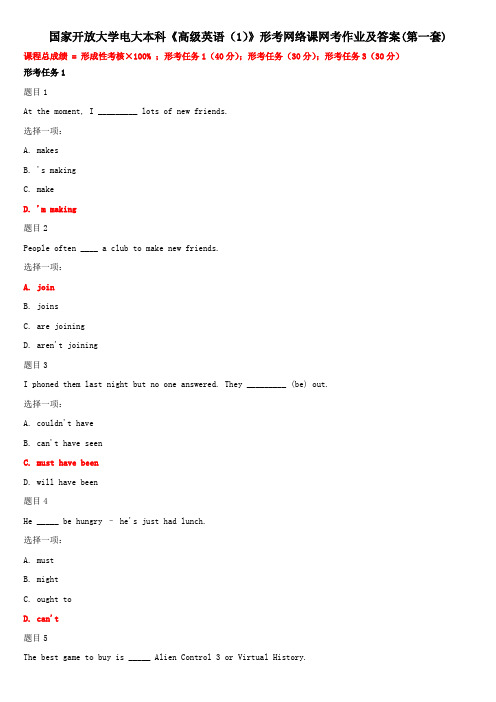
国家开放大学电大本科《高级英语(1)》形考网络课网考作业及答案(第一套) 课程总成绩 = 形成性考核×100% ;形考任务1(40分);形考任务(30分);形考任务3(30分)形考任务1题目1At the moment, I _________ lots of new friends.选择一项:A. makesB. 's makingC. makeD. 'm making题目2People often ____ a club to make new friends.选择一项:A. joinB. joinsC. are joiningD. aren't joining题目3I phoned them last night but no one answered. They _________ (be) out.选择一项:A. couldn't haveB. can't have seenC. must have beenD. will have been题目4He _____ be hungry – he's just had lunch.选择一项:A. mustB. mightC. ought toD. can't题目5The best game to buy is _____ Alien Control 3 or Virtual History.选择一项:A. anyB. eitherC. someD. none题目6We only had ______ before the final.选择一项:A. the three rest dayB. three days' restC. three day’s res tD. the rest of three days题目7I ___ buying her a cookery book for her birthday. 选择一项:A. expectB. manageC. mightD. thought about题目8This is probably the dead __________wallet.选择一项:A. soldiers'B. the soldier'sC. soldiersD. soldier's题目9___ the band ___ at the Rock Garden before?选择一项:A. Has … been playingB. Is … playingC. Has … playedD. Does … play题目10They ___ which record company to sign a deal with.选择一项:A. haven't decidedB. haven't been decidingC. don't decideD. hasn't decided题目11When he crashed the car, he _____ six bottles of beer.选择一项:A. drankB. was drinkingC. had drunkD. drinks题目12When her brother was in prison, she ___ him every month.选择一项:A. visitsB. had visitedC. visitedD. was visiting题目13You ___ buy a season ticket but a daily ticket is more expensive. 选择一项:A. can'tB. shouldn'tC. don't have toD. mustn't题目14You ____ tell anyone – it's a secret!选择一项:A. mustB. don't have toC. mustn'tD. have to题目15Hurry up! They _________ a group meeting in Room 6 soon.选择一项:A. may haveB. are havingC. have hadD. have题目16Mrs. Porter's heart is very weak and she is very ill. The doctors say she ___ die soon. 选择一项:A. mightB. 's going toC. willD. must题目17The motel___by the Lewis family in the 1950s.选择一项:A. is being startedB. has been startedC. startedD. was started题目18Today, the motel___by members of the same family.选择一项:A. has been managedB. was managedC. is managedD. will be managed题目19She told me that she___a car since 1990.选择一项:A. didn't driveB. wouldn't driveC. wasn't drivingD. hadn't driven题目20Darren said , “I don't know how it happened.”Darren said (that)_______________.(变成间接引语)选择一项:A. he didn't know how it happenedB. he didn't know how it had happenedC. I didn't know how it happenedD. I don't know how it happened形考任务2请同学们从以下口语交流任务中,选择一个口语任务,按照要求在自己的手机或者电脑上进行录音,然后将录制好的音频文件上传到课程平台。
电大开放英语1(光盘)参考答案(1).doc
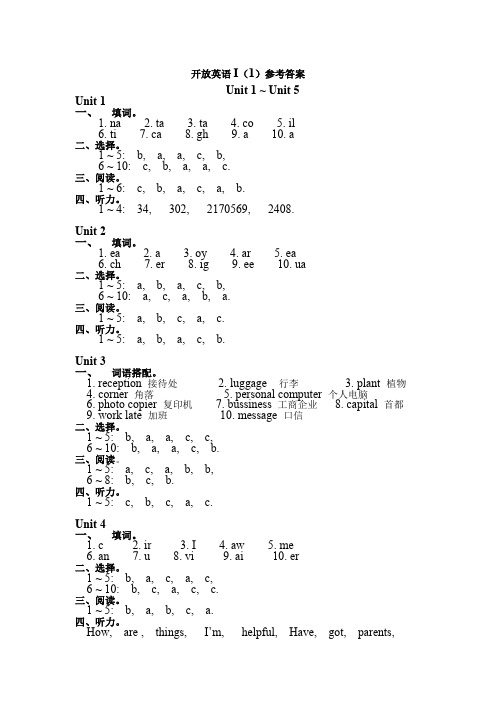
开放英语I(1)参考答案Unit 1 ~ Unit 5Unit 1一、填词。
1. na2. ta3. ta4. co5. il6. ti7. ca8. gh9. a 10. a二、选择。
1 ~ 5: b, a, a, c, b,6 ~ 10: c, b, a, a, c.三、阅读。
1 ~ 6: c, b, a, c, a, b.四、听力。
1 ~ 4: 34, 302, 2170569, 2408.Unit 2一、填词。
1. ea2. a3. oy4. ar5. ea6. ch7. er8. ig9. ee 10. ua二、选择。
1 ~ 5: a, b, a, c, b,6 ~ 10: a, c, a, b, a.三、阅读。
1 ~ 5: a, b, c, a, c.四、听力。
1 ~ 5: a, b, a, c, b.Unit 3一、词语搭配。
1. reception 接待处2. luggage 行李3. plant 植物4. corner 角落5. personal computer 个人电脑6. photo copier 复印机7. bussiness 工商企业8. capital 首都9. work late 加班10. message 口信二、选择。
1 ~ 5: b, a, a, c, c,6 ~ 10: b, a, a, c, b.三、阅读。
1 ~ 5: a, c, a, b, b,6 ~ 8: b, c, b.四、听力。
1 ~ 5: c, b, c, a, c.Unit 4一、填词。
1. c2. ir3. I4. aw5. me6. an7. u8. vi9. ai 10. er二、选择。
1 ~ 5: b, a, c, a, c,6 ~ 10: b, c, a, c, c.三、阅读。
1 ~ 5: b, a, b, c, a.四、听力。
How, are , things, I’m, helpful, Have, got, parents,any, cousins, Do, have, I, do, 62, in.Unit 5一、词语搭配。
电大——开放英语1形考册作业答案

开放英语(1)形考册参考答案作业1第一部分交际用语(每题2分,共10分)1. B2. B3. B4. A5. C第二部分词汇与结构(每题2分,共40分)6. B7. A8. C9. C 10. C11. B 12. B 13. C 14. C 15. C16. B 17. A 18. B 19. B 20. A21. B 22. A 23. B 24. A 25. B第三部分阅读理解(每题2分,共20分)26. B 27. C 28. B 29. A 30. A31. C 32. A 33. B 34. A35. C第四部分翻译(每题3分,共30分)以下答案供参考36. a quarter past seven (o’clock ) / seven fifteen37. from 8 (o’clock ) in the morning to 3 (o’clock ) in the afternoon / from 8 pm to 3 am38. works in insurance39. that’s a good idea40. Why don’t you41. 明天下午去踢足球怎么样?42. 我想找一套一楼的公寓。
43. 你喜欢看英文报纸吗?44.他不是程序员, 他是工程师。
45.她正在和客户谈话。
作业2第一部分交际用语(每题2分,共10分)1. C2. B3. B4. C5. C第二部分词汇与结构(每题2分,共40分)6. B7. C8. B9. A10. C11. C 12. A 13. A 14. A15. A16. B 17. A 18. B 19. A 20. A21. A22. C 23. A 24. B 25. C第三部分阅读理解(每题2分,共20分)26. B 27. A28. C 29. A 30. C31. C 32. A 33. A 34. B 35. B第四部分翻译(每题3分,共30分)以下答案供参考36. What’s the weather like today37. not comfortable enough38. opposite the supermarket39. Would you like to leave a message40. is bad at / isn’t good at41.她不喜欢向别人借东西。
中央电大开放英语(1)形成性考核册标准答案
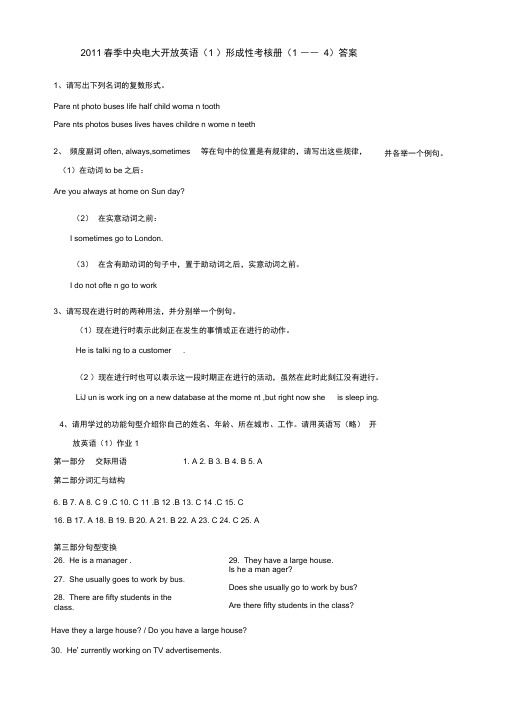
2011春季中央电大开放英语(1 )形成性考核册(1 ―― 4)答案1、请写出下列名词的复数形式。
Pare nt photo buses life half child woma n toothPare nts photos buses lives haves childre n wome n teeth2、频度副词often, always,sometimes 等在句中的位置是有规律的,请写出这些规律,(1)在动词to be之后:Are you always at home on Sun day?(2)在实意动词之前:I sometimes go to London.(3)在含有助动词的句子中,置于助动词之后,实意动词之前。
I do not ofte n go to work3、请写现在进行时的两种用法,并分别举一个例句。
(1)现在进行时表示此刻正在发生的事情或正在进行的动作。
He is talki ng to a customer .(2 )现在进行时也可以表示这一段时期正在进行的活动,虽然在此时此刻江没有进行。
LiJ un is work ing on a new database at the mome nt ,but right now she is sleep ing.4、请用学过的功能句型介绍你自己的姓名、年龄、所在城市、工作。
请用英语写(略)开放英语(1)作业1第一部分交际用语 1. A 2. B 3. B 4. B 5. A第二部分词汇与结构6. B7. A8. C 9 .C 10. C 11 .B 12 .B 13. C 14 .C 15. C16. B 17. A 18. B 19. B 20. A 21. B 22. A 23. C 24. C 25. A第三部分句型变换26. He is a manager .27. She usually goes to work by bus.28. There are fifty students in the class. 29. They have a large house.Is he a man ager?Does she usually go to work by bus? Are there fifty students in the class?Have they a large house? / Do you have a large house?30. He' s urrently working on TV advertisements.并各举一个例句。
Unit9开放英语I
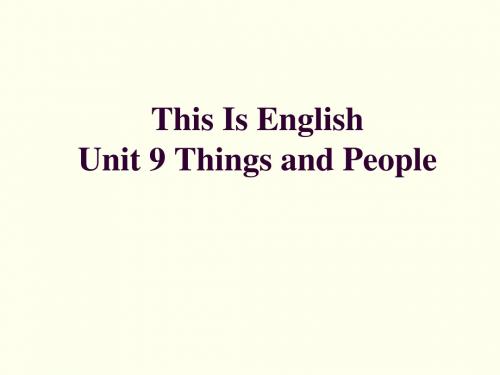
指路 The bus stop is outside the greengrocer's.
The supermarket is over there, opposite the café.
Yes, the bank is on the corner, near the station. Yes, there is. There is a bank on the corner, near the station. I’m sorry, I don’t know.
所学介词总汇(1)
Unit 1
Work with a person. Work for a company. Work at a place. Work in a town.
所学介词总汇(2)
Unit 2 (1)at, for, in at 用于具体时间和地点,如:
I work at BTVU. / He comes at 7:00. for 表示“为了”和“作为”,如: He works for IBM. She likes milk for breakfast. in 用于年,月,季节,…期间,如: in 1999, in May, in spring, in the morning/afternoon/evening
Unit 4 在某领域工作用in表示:
如 work in medicine Unit 7课文中介词: by plane/train/coach in the center from…to… Thank you for …
所学介词总汇(5)
Unit 8 表示方位介词
on 在…上面 above 在…之上 under在…下面 in front of 在…前面 behind在后面 in 在…里面 next to与…相邻
电大开放英语1各单元知识要点.doc

缩略式:1. 主语与be动词可缩在一起:e.g. I am...I’m She is...She’s He is...He’sYou are...You’reThey are...They’reWe are...We’re It is...It’s2. be 动词与否定词可缩在一起:e.g. is not = isn’t are not = aren’t英语中用来代替人或物的代词叫做人称代词。
用作主语的叫主格人称代词;用来作定语的叫做物主代词或人称代词的所有格。
1.主格(作主语)单数: I(我) you(你) he(他) she(她) it(它)复数: we(我们) you(你们) they(他们)e.g. I study English. 我学习英语。
You work in a company. 你在一家公司工作。
2.所有格(物主代词,作定语)单数:my(我的) your(你的) his(他的) her(她的) its(它的) 复数:our(我们的) your(你们的) their(他们的)e.g. My book is on the desk.我的书在桌子上。
Your book is on the self.你的书在架子上。
Their class is very big. 他们的教室很大。
I have a cat, its name is Mimi.我有一只猫,它的名字叫咪咪。
除了物主代词外,有时在一个名词后面加上’s 用来表示所有,叫做名词所有格。
e.g. Li L ie’s mother is a doctor.李雷的妈妈是名医生。
This is students’ reading room.这是学生阅览室。
这种名词所有格一般用在有生命的名词和时间名词上。
如是复数,只需在表示复数的S后加上一撇(’)即可。
有时表示店铺名称,由经营商加’s 构成。
e.g. the butcher’s 肉店 the baker’s 面包店the chemist’s 药店1.英语中动词用在一般现在时第三人称单数时,词后加”-s”:e.g. He works in a factory.他在一家工厂工作。
开放英语 1 unit 9

Activity 2
1. supermarket ---- milk 2. bank ---- dollars 3. post office ---- stamps 4. chemist(’s) ---- aspirin 5. greengrocer(’s) ---- apples 6. newsagent(’s) ---- newspaper 7. café---- a cup of coffee
Language Focus
表示方位的介词或介词词组 在指路时经常会用到下列表示方位的介词或介词 词组。 next to 表示“紧靠……旁边”: The supermarket is next to the chemist's. near 表示“靠近,在附近”: The bank is near the station. between 表示“在……中间”: The bank is between the post office and the café .
短语动词 短语动词是固定词组,由动词加介词或副词组成, 其作用相当于一个动词。短语动词需整体记忆, 因为其意义并非该动词组成部分的意义之和。例 如: They get up at 10 o'clock. (起床) They get on the bus at the station.(上车) They get on well together. (相处) They get off the bus at the swimming pool. (下车) I must get off to work.(动身,离开) Sam gets about a lot. He's in London today and last week he was in Edinburgh. (走动,旅行) This rainy weather gets me down. (使……情绪低 落)
电大《开放英语1》形成性考核册答案(完整)

开放英语(1)形成性考核册第一部分交际用语(10分)1一5小题:阅读下面的小对话,选择正确答案,并将所选项的字母符号写在各题前的()中,红色为参考答案。
(每题2分,共10分)(A)1.— How old is the manager?— He is 35 years old.A. Right.B. Wrong.(A)2.— What do they do?— They work in a bank.A. Right.B. Wrong.(B)3.— Would you like some crisps?— No, I’m sorry.A. Right.B. Wrong.(B)4.— How much does the flat cost a month?— It’s on the tenth floor.A. Right.B. Wrong.(A)5.— Could you sign the register, please?.— Of course.A. Right.B. Wrong.第二部分词汇与结构(40分)6-25小题:阅读下面的句子,选择正确答案,并将所选项的字母符号写在各题前的()中。
(每题2分,共40分)( B )6. He __________ foran IT company.A. workB. worksC. working( A )7. I have coffee _______ breakfast time.A. atB. inC. on( C )8. ______ name is Wanghua.A. HeB. He’sC. His( C )9. She is _______ only accountant in my son's company.A. aB. anC.the( C )10. Maria often has a walk with ________parents in the morning.A. sheB. theirC. her( B )11. ___________ you gotany family?A. DoB. HaveC. Has( B ) 12. He’s responsible________ the central computer system.A. inB. forC. of( C )13. The Business Banking Department is on ________floor.A. SecondB. the twoC.the second( C )14. Wang Li is _________a new marketing campaign at themoment.A. planB. planingC.planning( C )15. Polly enjoys ______the guitar in a band in her freetime.A. playB. to playC.playing( B )16. There _________three plants in the corners ofthe room.A. isB. areC. have( A )17. I work in __________IT Department of ________ largebank.A. the, aB. a, theC. a, a( B )18. What _______“nr"mean?A. isB. doesC. do( B )19. I sometimes go to thepub ______ Friday.A. inB. onC. at( A ) 20. ___________ peopleare my friends. ________ peopleare my husband's friends.A. These, ThoseB. This,That C. Here, There( B )21. He _________ inBeijing, but his parents________ in Hangzhou.A. live, livesB. lives, liveC.live, live( A )22. My husband doesn't________, but I like it verymuch.A. like shoppingB. likesshoppingC. likes to shop( C )23.--- ______ are youfrom?--- I’m from Nanjing.A. WhatB. WhenC.Where( C )24. He ___________ lunchin the canteen right now.A. hasB. haveC. ishaving( A )25. _______children hashis brother got?A. How manyB. How muchC. How about第三部分句型变换(15分)26. He is a manager.Is he a manager?27. She usually goes to work bybus.Does she usually go to work bybus?28. There are fifty students inthe class.Are there fifty students inthe class?29. They have a large house.Have they a large house? / Doyou have a large house?30. He’s currently working on TVadvertisements.Is he currently working on TVadvertisements?第四部分:阅读理解(20分)31一35小题:阅读下列短文,并根据短文内容判断其后的句子是正确(Right),还是错误(Wrong),并将答案写在各题前( )中。
2012年(秋)电大行政管理《开放英语(1)形成性考核册》参考答案
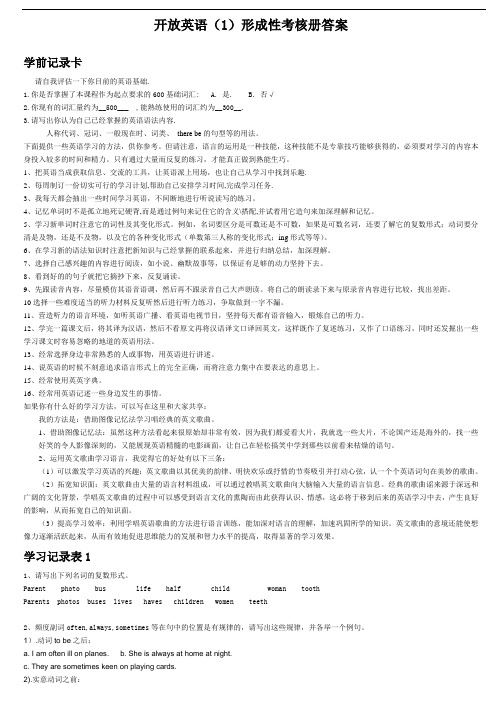
开放英语(1)形成性考核册答案学前记录卡请自我评估一下你目前的英语基础.1.你是否掌握了本课程作为起点要求的600基础词汇: A. 是. B. 否√2.你现有的词汇量约为__500___ ,能熟练使用的词汇约为__300__.3.请写出你认为自己已经掌握的英语语法内容.人称代词、冠词、一般现在时、词类、there be的句型等的用法。
下面提供一些英语学习的方法,供你参考。
但请注意,语言的运用是一种技能,这种技能不是专靠技巧能够获得的,必须要对学习的内容本身投入较多的时间和精力。
只有通过大量而反复的练习,才能真正做到熟能生巧。
1、把英语当成获取信息、交流的工具,让英语派上用场,也让自己从学习中找到乐趣.2、每周制订一份切实可行的学习计划,帮助自己安排学习时间,完成学习任务.3、我每天都会抽出一些时间学习英语,不间断地进行听说读写的练习。
4、记忆单词时不是孤立地死记硬背,而是通过例句来记住它的含义\搭配,并试着用它造句来加深理解和记忆。
5、学习新单词时注意它的词性及其变化形式。
例如,名词要区分是可数还是不可数,如果是可数名词,还要了解它的复数形式;动词要分清是及物,还是不及物,以及它的各种变化形式(单数第三人称的变化形式;ing形式等等)。
6、在学习新的语法知识时注意把新知识与已经掌握的联系起来,并进行归纳总结,加深理解。
7、选择自己感兴趣的内容进行阅读,如小说、幽默故事等,以保证有足够的动力坚持下去。
8、看到好的的句子就把它摘抄下来,反复诵读。
9、先跟读音内容,尽量模仿其语音语调,然后再不跟录音自己大声朗读。
将自己的朗读录下来与原录音内容进行比较,找出差距。
10选择一些难度适当的听力材料反复听然后进行听力练习,争取做到一字不漏。
11、营造听力的语言环境,如听英语广播、看英语电视节目,坚持每天都有语音输入,锻炼自己的听力。
12、学完一篇课文后,将其译为汉语,然后不看原文再将汉语译文口译回英文,这样既作了复述练习,又作了口语练习,同时还发掘出一些学习课文时容易忽略的地道的英语用法。
电大英语1网上作业第九单元答案

Unit 9 Things and PeopleChoose the correct answers.1.People usually buy aspirins at .the chemist`ssupermarketpost office2.A lot of Westem people go to the once a week to buy food and drinks.chemist`scafesupermarket3.He likes helping people. He is .kindconfidentintelligent4.Mary likes going to parties and meeting new people. Mary is . quietshyoutgoing5.David enjoys talking.He never stops talking.He is .talkativeintelligentstupid6.Jane puts on weight if she doesn`t exercise. He has to . work it output it onwork it off7.John can always make people laugh.He is very . funnyshyserious8.I`m going to the newsagent`s to buy some .milknewspapera cup of coffee9.A:Where do you usually ?B:At the gym.traingowork out10.Rose can`t find her bag. She is it.findinglooking afterlooking forChoose the correct answers.1.A: So, you have a boy friend. ? B: He is tall and he`s good-looking.How does he look like?What does he look like?How tall is he?2. A: ?B: You can`t take the number 56 bus. Where is the bus stopHow can I get thereWhere do I get off3. A: get on?B: You get on at the greengrocer`sWhere do IHow toWhich bus do I4.A: a newsagent here?B: Yes,there is. It`s just over there.Where isIs thereHave you got5. A: ?B:He`s got short brown hair and short beard.What does he look likeWhat is his hair likeHow is he6. A: ?B: She is very outgoing.What`s Mary likeWhat does Mary look likeWhat does Mary like7. A: get off the bus?B: You get off opposite the station.How do IWhere do IWhen do you8. A: , I`m looking for the chemist`s. B: Yes. There`s one opposite the cafe.SorryHelloExcuse me9. A: the bank?B: It`s between the cafe and the newsagent`s.Where isDo you live nearDo you know10. A: Is there a supermarket near here?B: .It`s just around the corner.Sorry, I don`t knowYes, there isNo, there isn`tRead and choose the correct answers.Hu Ping gets up late and decides to go out. He wants to go to the gym today. So he goes to the shops and waits for the bus. He gets on the bus. Pays his fare and sits down. He gets off at the station and walks to the gym.On his way to the gym he comes across Li Lin. They go in together. They stay at the gym all morning and then decide to go back to Li Lin`s flat together to have something to eat. They stay in and listen to music all aftermoon and then he goes back home.1. Hu Ping is a gym owner.TrueFalse2.Hu Ping goes to the gym by bus.TrueFalse3.Hu Ping works out at the gym by himself.TrueFalse4.Hu Ping and Li Lin have their luch together.TrueFalse5.Li Lin and Hu Ping are friends.TrueFalse6.Li Lin and Hu Ping have their lunch at a restaurant. TrueFalseListen and fill in the gaps.1. W hat`s Nigel`s height?1 metre 851 meter 551 meter 752. What`s Nigel`s hair like?long and fairshort and darkshort and fair3. What`s the color of Frank`s beard? greybluebrown4. What does Frank like doing? fishingskiingswimming。
开放英语1Unit 9 Things and People
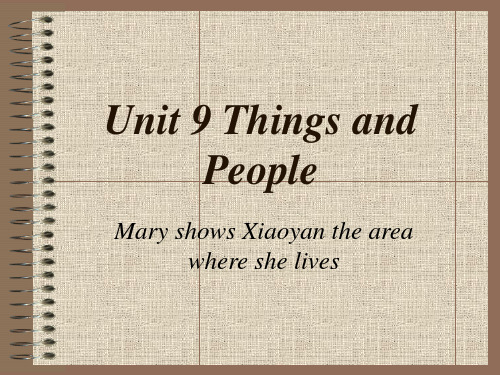
Review Reminder; 1,It’s between the post office and the bank. It’s near/ opposite/outside/next to the bank. 2, Where’s the (nearest)…? It’s near opposite/outside the… Is there a..near here? How do I get to…? You take the bus No,28. Where do I get on/off?/You get on/off at… 3,What does he look like? He’s tall/short /one metre seventy/… He’s got…/ What is he like?He is kind…
Activity 17: 1, Where does he live? B: In London. 2, What does he like doing? B:Well,mainly sports--football and swimming. 3, What does he look like? B: Tall and good-looking. 4, What’s he like? B; Very friendly and nice—of course. 5, What does he do? B: He’s a doctor in a hospital.
一语言点(language focus)
1.店铺的名称:经营商+’s (shop) E.g. the butcher’s=the butcher’s shop the chemist’s =the chemist’s shop 2.定冠词和不定冠词 the:具体或只有一处商店或住所; a/an:不是具体; E.g. The bus stop is outside the post office. The supermarket is next to the chemist’s. There’s a supermarket opposite the station and a supermarket near a bank.
开放英语(1)选择题(Units1-11)

开放英语(1)选择题(Units1-11)开放英语(1)150 选择题Unit 11. ______ you a student of Shanghai TV University?A. IsB. AreC. Am2. My name ______ Lin Yan, and I ______28 years old.A. is, amB. is, isC. am, am3. I’m Chinese. Where ______ from?A. do youB. are youC. you come4. He ______ in London. He ______ in New York.A. doesn’t live, liveB. don’t live, livesC. doesn’t live, lives5. Kate and Mike always do ______ homework together.A. hisB. herC. their6. This is not ______ dictionary. It’s______.A. your, Jane’s sisterB. my, Jane’s sister’sC. her, Jane’s sister7. We brush our ______ twice a day.A. toothB. teethC. tooths8. In autumn, the ______ fall down from the tree.A. leafB. leafsC. leaves9. A: What is your job?B: ______ an accountant.A. You areB. I amC. He is10. A: ______ are your parents?B: They are in china.A. WhatB. How oldC. WhereUnit 21. Why ______ go swimming there?A. often do youB. do you oftenC. do often you2. What ______ on Sundays?A. Tom usually doesB. does Tom usually doC. does Tom usually3. Mary was ______ late for classes until she lost her watch.A. alwaysB. oftenC. never4. ______ she goes to a bar in the evening with her colleagues.A. AlwaysB. SometimesC. Never5. The time is 9:40. It’s ______.A. forty to nineB. nine to fortyC. twenty to ten6. A: What time is it now?B: It’s ______.A. ten to nineB. fifty past eightC. fifty eight7. Which choice is wrong?A. He hasn’t any tickets for the football match.B. He hasn’t got any tickets for thefootball match.C. He doesn’t has any tickets for the football match.8. A: Has he got any dictionaries?B: Yes, he ______.A. doesB. doC. has9. A: Would you like to have a coffee?B: ______.A. yes, pleaseB. Yes, certainlyC. No, I’m sorry10. A: Could you sign the register, please?B: ______.A. Yes, pleaseB. Yes, of courseC. No, thank youUnit 31. T his isn’t ______ easy job. I can’t finish it in ______ hour.A. a, aB. an, aC. an, an2. The IT Department is on ______ eighth floor of that building.A. /B. anC. the3. Beijing is ______ capital of China. It’s ______ very big city.A. a, theB. the, aC. a, a4. That is my CD, and ______ are yours.A. thisB. thatC. those5. There is ______ on the table.A. some breadB. some crispC. some peanut6. There aren’t ______ books in my bag.A. noB. someC. any7. Shall I ask him ______ time?A. twoB. secondC. a second8. There are ______ months in a year. ______ month is December.A. twelve, The twelfthB. twelfth, TwelveC. the twelve, Twelfth9. A: I’m going to clean the house.B: ______ do the shopping.A. I like toB. I wouldC. I’ll10. A: What would you like to drink?B: _______.A. Beer, pleaseB. Yes, pleaseC. No, thanksUnit 41. He ______ lunch with a customer now.A. hasB. haveC. is having2. Rose _______ two cousins in New York.A. has gotB. having gotC. is having3. Look at Tom! What ______?A. does he doB. is he doingC. he is doing4. It ______ hard, and I can’t go home without an umbrella.A. rainsB. rainingC. is raining5. I’m Japanese. Where ______ from?A. do you comeB. are you comingC. you are coming6. These ______ are very expensive.A. womens handbagsB. womens’ handbagsC. women’s handbags7. ______ football is under his bed.A. JonesB. Jones’C. Jones’s8. In front of the house are ______ cars.A. Tim and Jack’sB. Tim’s and JackC. Tim’s and Jack’s9. A: What do you do?B: ______.A. I’m an advertising managerB. I’m on holiday right nowC. I’m looking for my pen10. A: What is he doing?B: _______.A. He is an engineerB. He is talking to MaryC. He works in a construction company Unit 51. The book cost ten ______ and fifty ______.A. dollar, centB. dollar, centsC. dollars, cents2. The rent is ______ each month.A. 2,000 yuansB. 2,0000 yuans’C. 2,000 yuan3. On the table there are ______.A. five ten-dollar billsB. five ten-dollars billC. five ten dollars bills4. The new house ______ £300 a month.A. spendsB. costsC. pays5. I ______ the flat in the centre of the town.A. am interested inB. am interesting inC. interest6. They are looking ______ a flat. They want one with a garden.A. onB. outC. for7. You can talk ______ with him.A. face to faceB. face on faceC. face with face8. I don’t like ______ things I don’t understand very well.A. talking aboutB. talking toC. talking with9. ______ call a taxi?A. What aboutB. How aboutC. Why don’t you10. How about ______?A. taking a holidayB. take a holidayC. to take a holidayUnit 71. They had a party ______ Christmas Eve.A. atB. inC. on2. It happened to be very cold ______ the morning of our sports meet.A. atB. ofC. on3. He decided to visit the family ______ Friday night.A. atB. inC. on4. My uncle lives ______ 105 Handan Road.a. on B. atC. of5. A: Are you free on Monday?B: No, I’m sorry, I’m busy. ______ Wednesday?A. Would you likeB. What aboutC. Why don’t you6. A: ______ to come to dinner tonight? B: Yes, I’d love to.A. Why don’t youB. What aboutC. Would you like7. The coat is ______ too large for me.A. veryB. quiteC. much8. The table is ______ for two people.A. not big enoughB. big not enoughC. big enough not9. How long ______?A. has the journeyB. is the journey likeC. does the journey take10. It takes ages ______.A. for doing the shoppingB. to do the shoppingC. does the shoppingUnit 81. There is a beautiful clock ______ the wall of her bedroom.A. onB. overC. above2. A bridge was built ______ the river.A. onB. overC. above3. The cup is ______ the desk lamp.A. betweenB. amongC. next to4. Mary is sitting ______ Tom.A. in the front ofB. in front ofC. at the front of5. ______ Chinese in your English class.A. Not speakB. Don’t speakC. No speak6. Please ______ it on the small table.A. to putB. puttingC. put7. What’s the weather ______ this winter?A. likeB. inC. be8. It ______ in summer in England.A. will often rainB. is often rainingC. often rains9. You ______ in the office.A. can’t noisyB. can’t be noisyC. can’t make noisy10. A: Can I use the phone in the hall?B: ______.A. You can use themB. I’m afraidC. Of courseUnit 91. There is a chair ______ the corner of the room.A. inB. atC. under2. I’ll meet you ______ the corner of Smith Street.A. overB. inC. on3. Please wait for me ______ the corner ______ three o’clock.A. in, inB. on, onC. at, at4. ______! There’s a train coming.A. Look outB. Look aroundC. Look forward5. I cannot hear the radio. Would you please ______?A. turn it onB. turn it downC. turn it up6. The bus broke down and all the passengers had to ______.A. get inB. get onC. get off7. We should not be ______ towards ourcomrades.A. coldB. friendlyC. kind8. Mary doesn’t like going to parties andmeeting new people. She is very ______.A. shyB. socialC. outgoing9. A: What does he ______?B: He is tall and good-looking.A. likeB. lookC. look like10. A: ______ is the nearest supermarket,please?B: It’s opposite the restaurant.A. WhatB. WhereC. HowUnit 101. A: I’d like ______ information about the school.B: You could have ______ word with theschoolmaster.A. some, aB. an, someC. some, some2. I need ______ cloth, for I am going to make ______ clothes.A. a lot of, manyB. much, muchC. many, many3. Tables are made of ______.A. woodB. woodsC. some woods4. I’ve been expecting ______ letters thewhole day, but there aren’t ______ for me.A. some, anyB. many, a fewC. some, one5. Why don’t you have ______ bread?A. anyB. someC. little6. You can see ______ on the table.A. a packet of prawnB. two packetsof prawn C. a packet of prawns 7. A: How ______ bottles of wine will weneed?B: We’ll need about 6 bottles, I think.A. manyB. muchC. more8. A: How ______ is the rent?B: It’s about 200 pounds a month.A: many B. muchC. more9. Would you like ______ this afternoon?A. go shopping with meB. to go shopping with meC. to going shopping with me10. Shall I ______?A. phone him nowB. to phone him nowC. phoning him nowUnit 111. Mary ______ on shoes when she ______ them.A. tries, buysB. tries, buiesC. trys, buys2. The girl often ______ cold when she ______.A. catch, dancesB. catches, dancesC. catchs, dancees3. ______ your mother ______ some cleaning on Sundays?A. Does, doesB. Do, doesC. Does, do4. _______ Tom ______ to work hard to help his family? Yes, he ______.A. Does, have, doesB. Has, /, doesC. Does, has, has5. Which ______ teacher ______ lessons to you every day?A. /, givesB. does, giveC. do, give6. Many young people enjoy ______ sports games.A. watchB. watchingC. to watch7. I prefer watching TV ______.A. to read the paperB. reading the paperC. to reading the paper8. Can you show me how ______?A. use the washing machineB. to use the washing machineC. using the washing machine9. A: I sleep late on Sundays.B: So ____ I.A. haveB. doC. am10. A: Mary does a lot of housework before going to work.B: ______.A. So do I tooB. So I tooC. Me too。
电大英语unit1学习目标、单词
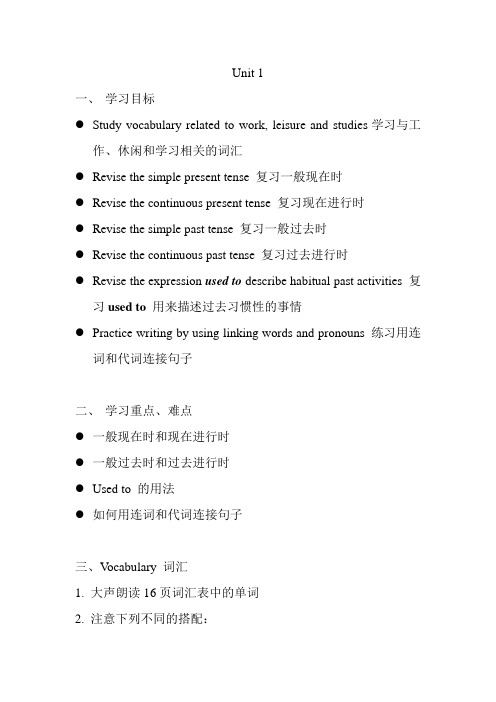
Unit 1一、学习目标●Study vocabulary related to work, leisure and studies学习与工作、休闲和学习相关的词汇●Revise the simple present tense 复习一般现在时●Revise the continuous present tense 复习现在进行时●Revise the simple past tense 复习一般过去时●Revise the continuous past tense 复习过去进行时●Revise the expression used to describe habitual past activities 复习used to用来描述过去习惯性的事情●Practice writing by using linking words and pronouns 练习用连词和代词连接句子二、学习重点、难点●一般现在时和现在进行时●一般过去时和过去进行时●Used to 的用法●如何用连词和代词连接句子三、V ocabulary 词汇1. 大声朗读16页词汇表中的单词2. 注意下列不同的搭配:listen to something on the radio 听广播watch something on the TV 看电视read something in the newspaper 读报纸on the bus 在公交车上in the taxi 在出租车上read newspaper 看报see a film 看电影watch a match 看比赛visit a friend 看朋友call on sb 拜访某人call at some place 访问某地3. Activity 1•Connection 关系•Details of your family家庭情况•Details of your studies/hobbies/interests学习/爱好/兴趣情况•Be relevant to 与….相关•Apply for 申请•Be available for sth 有空做某事4. Activity 2•Human resources department 人力资源部•Summer work placement 暑期实习安排•Enquire /inquire about 咨询•The possibility of a placement 获得实习机会•Sports Desk,体育编辑部foreign desk,国际部financial desk 金融部•During 时期•Take on 聘用•Currently现在/specialization /major 专业•Journalism /新闻学journalistic新闻学的•Racquet/racket sports拍球运动•Be interested in 很愿意从事• A full range of 各个种类的•Grow up 长大•Apart from=except for 除….之外•Enjoy doing 喜欢做某事•Enclose 信后面附上•Feature article专题文章•“Women in snooker” which won.. 《台球运动中的女性》获得了•Work on 从事•Influence on 影响•Look for/ at/ out/ after/ out of ..•Be available for an interview at any time面试的时间对我不是问题•Therefore所以•Thanks for your consideration 谢谢你考虑•Look forward to doing 期望I am looking forward to hearing from you. 我期待着收到你的来信。
大学英语1 Unit 9 Special Hobbies, Special Friends课堂笔记

大学英语1Unit 9 Special Hobbies, Special Friends课堂笔记及练习题主题:Unit 9 Special Hobbies, Special Friends学习时间:2015年12月7日-12月13日内容:我们这周主要学习如何谈论兴趣爱好,掌握有关电视电影方面的主要动词及动词搭配,了解现在分词的构成和用法,并在今后的写作中可以灵活运用它们组词造句。
一、学习要求1.掌握影视方面的主要的动词的用法;2.了解现在分词的特点和用法;3.在写作中灵活应用现在分词组句。
二、主要内容(一)谈论兴趣爱好的表达方式1. One of his recent hobbies is playing online games.他最近喜欢玩网络游戏。
2. He took up diving as a hobby.他把潜水当作一种消遣。
3. He has a hobby for cooking.他的爱好是烹饪。
4. Hobbies can make our life a bit easier and more enjoyable.爱好能使人生变的更轻松更幸福。
5. Happy is the man whose living is his hobby.沉醉于某种爱好的人是幸福的。
6. It would be impossible for him to drop his hobby.要他放弃自己的个人爱好是不可能的。
7. I have always liked listening to inspiring speeches.我一直喜欢听鼓舞人心的演讲。
8. I enjoy reciting an English passage every day.我喜欢每天背诵一点英文短文。
9. I'm crazy about the ancient China poetry.我迷上了中国古代诗词。
10. I have a passion for American movies.我酷爱美国电影。
- 1、下载文档前请自行甄别文档内容的完整性,平台不提供额外的编辑、内容补充、找答案等附加服务。
- 2、"仅部分预览"的文档,不可在线预览部分如存在完整性等问题,可反馈申请退款(可完整预览的文档不适用该条件!)。
- 3、如文档侵犯您的权益,请联系客服反馈,我们会尽快为您处理(人工客服工作时间:9:00-18:30)。
Unit 9 Things and People学习重点:一、店铺的名称(P100)二、定冠词和不定冠词(P101)二、问路及指路(P102)(P104)三、短语动词(P106)四、谈论人的外貌和性格特征(P108)重点语法释析1、定冠词和不定冠词(P101)冠词的定义冠词是虚词,本身不能单独使用,也没有词义,它用在名词的前面,帮助指明名词的含义。
冠词可以说是名词的一种标志,它不能离开名词而独立存在。
表示的主语数量或者特征冠词的分类冠词分为不定冠词"a,an"、定冠词"the"和零冠词三种,零冠词指的是不用冠词的情况。
不定冠词"a,an"表示泛指,定冠词表示特指。
a、an仅用在单数可数名词前来表示“一”的意义,但不强调数目概念,只表示名词为不特定者。
定冠词的用法巧计定冠词the用法歌诀:特指双方熟悉,上文已经提起。
世上独一无二,方位名词乐器。
某些专有名词,还有复数姓氏。
序数词最高级,习惯用语要牢记。
冠词口诀冠词分为定冠、不定冠,不定冠词a和an,“—”的含义表泛指表示特指要用the,次序、方位、最高级世上物体独一个,人或事物再次提以下情况冠词免,学科球类三顿饭名词复数表泛指,季节星期月份前不定冠词的用法不定冠词有"a和an"两种形式。
"a"用在以辅音音素开头的词前,"an"用在以元音音素开头的词前。
判断一个词是以元音开头还是以辅音开头,是根据读音而不是根据字母。
一般情况下,an用在元音之前,而不是原音字母之前,例如an hour1. 用于可数名词的单数形式前,表示"一"There is a tiger in the zoo.(There is only one tiger in the zoo.)动物园里有一只老虎。
2. 表示一类人和东西A tiger can be dangerous.老虎可能有危害性。
(也可用定冠词the +形容词代表一类人)The poor are still poor.3. 表示"某一个"的意思A gentleman wants to see you.有一位先生要见你。
(The gentleman wants to see you.这位先生要见你。
)4. 表示"同一"的意思They are nearly of an age.他们几乎同岁。
The two shirts are much of a size.这两件衬衫大小差不多。
5. 表示"每一"的意思We go swimming four times a week.我们每周去游泳四次。
6. 用在作表语的单数可数名词前,表示身份、职业My mother is a teacher.我妈妈是教师。
7. 第一次提到的人或事物,但不特别指明是哪一个Long long ago there was an old king who had a very beautiful daughter.很久很久以前,有一个年老的国王,他有一个非常美丽的女儿。
定冠词的用法1. 用以特指某(些)人或某(些)事物This is the house where Luxun once lived.这是鲁迅曾经住过的房子。
2. 用于指谈话双方都明确所指的人或事物Open the door, please.请把门打开。
3. 用以复述上文提过的人或事物(第一次提到用“a或an”,以后再次提到用“the”)Once there lived a lion in the forest. Every day the lion asked small animals to look for food for him.从前森林里住着一只狮子。
每天这只狮子要小动物们为他寻找食物。
4. 用在序数词和形容词最高级前January is the first month of the year.一月份是一年当中的第一个月。
Shanghai is the biggest city in China.上海是中国最大的城市。
5. 表示宇宙中世界上独一无二的事物the sun 太阳the moon 月亮the earth 地球the sky 天空the world 世界6. 指由普通名词构成的专有名词the West Lake 西湖the Great Wall 长城the United States 美国the United Nations 联合国7. 表示方向、方位用在表示计量的名词前{度量衡} by the ton/pound/yard/metre/kilo 注意by后面接上表示面积体积重量长高短深时中间不加冠词如by volume/weight/length/width/depthin the east 在东方in the west 在西方in the front 在前面at the back 在后面in the bottom 在底部at the top 在顶部on the right 在右边on the left 在左边8. 在海洋、江河、湖泊、山脉、海峡、海湾等地理名词前the Pacific Ocean 太平洋the Huanghe River 黄河the Tianshan Mountains 天山山脉the Taiwan Straits 台湾海峡9. 在姓氏复数前,表示一家人The Bakers came to see me yesterday.贝克一家人昨天来看我。
10. 和某些形容词连用,使形容词名词化,代表一类人或物the poor 穷人the rich 富人the sick 病人the wounded 伤员the good 好人the beautiful 美丽的事物14. 表示演奏乐器时,乐器的前面要加theplay the piano 弹钢琴play the violin 拉小提琴*中国乐器名词前不与冠词连用:play erhu(二胡)]2、问路和指路(1)(P102)1) Where is +场所?Where is the hospital?Where is the bus stop, please?The bus stop is outside the greeenprocer’s.2) Where is the nearest+ 场所?Where is the nearest primary school?Where is the nearest supermarket, please?The supermarket is over there, opposite the café.3) Is there + a/an + 场所?Is there a supermarket near our school?Is there a back near here?Y es, the bank is on the corner, near the station.Y es, there is. The bank is on the corner, near the station.I’m sorry I don’t know.问路与指路(2)(P104)问路How do I get there?How do I get to the bus station?Where do I get on?Where do I get off?指路Y ou take the number 38 bus.Y ou get on at the greengrocer’s.Y ou get off at the bus station.3、短语动词:(P106)短语动词动词加副词小品词以及动词加介词构成的动词短语叫短语动词(Phrasal Verb)。
英语中有许多短语动词在意义上是一个整体,其用法有的相当于及物动词,有的相当于不及物动词,有的兼有及物动词和不及物动词的特征。
英语短语动词的构成主要有以下几种:(1) 动词+介词常见的有look for, look after, send for, care about, ask for, laugh at, hear of (from), add to, lead to等。
这类短语动词的宾语只能放在介词后。
如:Don't laugh at others.I didn't care about it.(2) 动词+副词常见的有give up, pick up, think over, find out, hand in, point out等。
这类短语动词的宾语如果是名词,既可放在副词前边,又可放在副词后边;宾语如果是人称代词或反身代词,则要放在副词前边。
如:You'll hand in your homework tomorrow.Please don't forget to hand it in.(3) 动词+副词+介词常见的有look down upon, go on with, break away from, add up to, catch up with 等。
这类短语动词的宾语只能放在介词后边。
如:All his money added up to no more than $100.After a short rest, he went on with his research work.构成短语动词的副词和介词都统称为小品词(Particle)。
短语动词需整体记忆get up 起床get on 上车/ 相处get off 下车/ 动身,离开get about 走动,旅行get sb. down 使---情绪低落4、谈论人的外貌和性格特征(P108)1、What does he look like ? “他长什么样儿”指外貌特征2、What's he like ?(性格特征)描述人的胖与瘦的词汇P109描述人的性格特征的词汇P1105、形容词形容词是用来修饰名词,表示名词的属性或特征的词。
1)作定语:形容词紧靠着〔代〕名词,直接修饰该〔代〕名词。
He is a clever boy.They are good students.The Chinese people are a great people.形容词作定语一般位于被修饰语之前,但在有些情况下,位于被修饰语之后:a) 被修饰词是复合不定代词something; anything; everyone; anybody...等:I'll tell you something important.That's nothing new.b) 被修饰语前有only, every, best, all等限制性较强的定语时:Those are the only books available. 这些是仅有的书。
